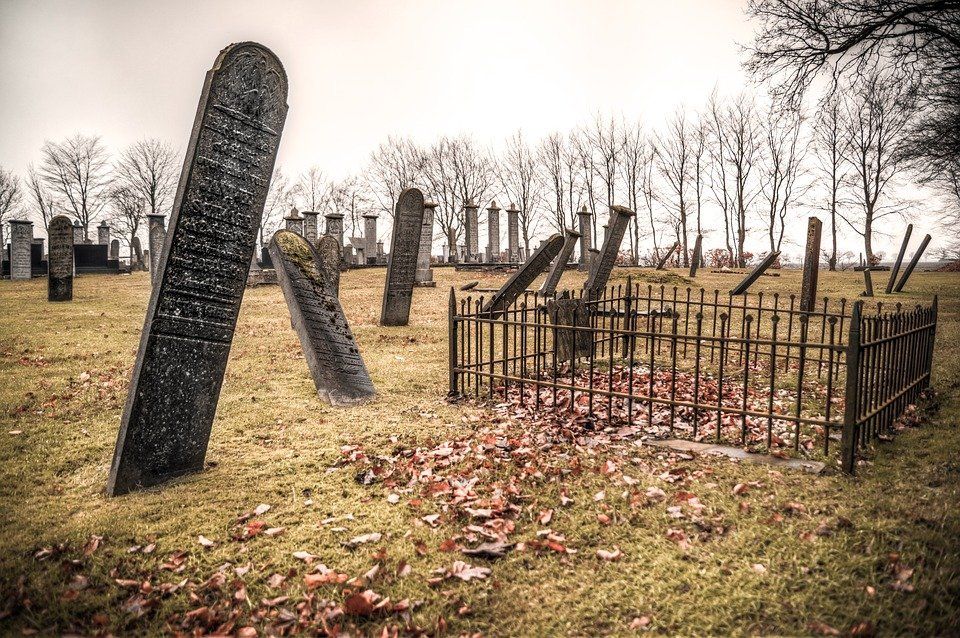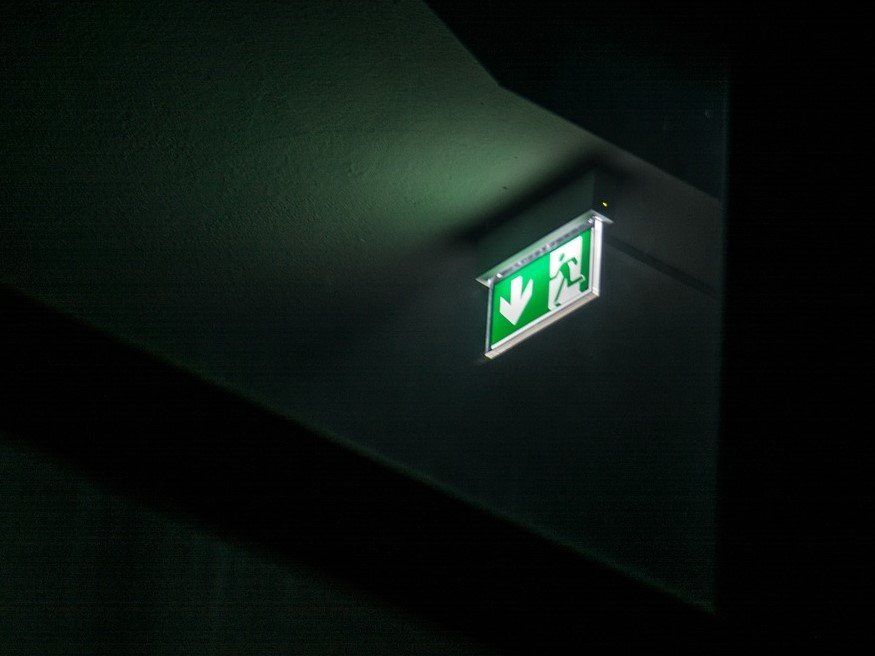We are living in increasingly hopeless days. The modern view of man is appallingly bleak. He is judged to be defective in the very structures of his personality.
And since the finer elements of his nature are not going to be victorious in his ‘evolutionary development’, it is only a matter of time before the full force of human depravity will be felt within the world.
Throughout this century there have been eruptions of fear that the human race will succeed in destroying everything that was ever worthwhile.
It is ripe for such despair to break out again.
No hope
Raymond Briggs, the author-illustrator, presents this gloomy outlook in his book (and cartoon film) When the wind blows.
It is a story of the last Adam and Eve, dying without hope in a world totally ruined by nuclear war. Even Briggs’ story of the life and death of his parents, Ethel and Ernest, has that same obsession with death.
Ultimate reality for him is the grave, not the skies. There is nothing else.

Again, novelist Jim Crace has written two books, the first called Quarantine is an interpretation of Christ’s forty days in the desert. It won him a Whitbread award and a nomination for the Booker prize.
His second book, which appeared last October, is called Being dead (Viking). The story is obsessed with the ultimate reality of death.
Hugging the spaces
The book features two zoologists, Celice and Joseph, a married couple in their fifties, who are dead.
The tale discovers them shortly after their murder among sand-dunes, and records their bodies’ deterioration over six days, until they are discovered by the police. By then only fragments remain, thanks to the hunger of the various species of crabs, gulls and flies inhabiting Baritone Bay.
‘Crace spares us few details of the couple’s decomposition’, writes reviewer Miranda France (The Spectator, 2 October 1999). ‘There is a toughening of skin, a congealing of blood, horrid suppurations, and worse. On the fourth day swag-fly maggots emerge, generated by the heat in Joseph and Celice’s innards’.
What is the book’s message? It is twofold.
Firstly, that humans are just a different kind of animal; Joseph tells one of his students: ‘We hardly count in the natural orders of zoology. We’ll not be missed’.
Secondly, that though there is no avoiding death, love keeps handing itself on, and we are to hug the spaces in between.

Man without God
The grimness of the human condition without God is also expressed in music, both popular and classical.
Recently the Borodin String Quartet were performing at the Wigmore Hall. The climax of the evening was the last of Shostakovich’s quartets.
It was written at the height of the Stalinist era, during which 12 million people were arrested in USSR and two million died (a million being executed and the rest dying from cold, starvation and illness).
They were bleak days and this composition relentlessly echoes the history of Russia during this terrible period, in intense, discordant, unharmonic, cursed music.
The mood of tragedy was intensified that night by a couple of decisions the Quartet took. All the house lights were switched off except the Exit signs. The quartet played by the light of four candelabra.
As the final notes died away, the four men blew out the lights and walked off the stage in complete darkness. They had requested no applause.
The concert expressed two contrasting elements: composer and musicians, in creative brilliance, reflecting the divine image; but also the tragic theme, reflecting the hopeless depravity of man.
Evil restrained
In the Bible, the fact of our depravity does not stand as an independent element, controlling our history and the destiny of man. Although every part of man has been affected by sin, man has not become, nor will he become, absolutely evil.

Man still retains the image of God. As soon as man’s inability to perform good works is revealed in the Bible, the grace and sovereign providence of God are also revealed.
The seed of the woman is promised, to crush Satan’s head. The requirements of the law are written in everyone’s heart (Romans 2:14-15). God’s restraining grace begins to curb the darkest tendencies of the human heart.
Even the Cainite civilisation of Genesis 4 displayed music, poetry and metal-craft. God appoints civil magistrates to perform his will, punishing evil-doers and rewarding well-doers (Romans 13:1-7). And so we could continue.
Salt and light
Above all, God’s people, in whom the divine image is being renewed, are salt and light in the world. The Bible still has an extraordinary influence in the world.
No Calvinist has difficulty with Shakespeare’s words in Hamlet: ‘What a piece of work is a man! How noble in reason! How infinite in faculty! In form and moving how express and admirable! In action how like an angel! In apprehension how like a god! The beauty of the world! The paragon of animals! … this quintessence of dust.’
This may be Renaissance man’s attitude to himself, but it is also descriptive of man as he came from his Maker’s hands. It eloquently expresses the bravery, altruism and self-denial of which even the natural man is capable.
But that just underlines God’s common grace, not man’s goodness, for he has none (Romans 3:9-12).
Heroism
One thinks of the early Chinese communists, described in Jung Chang’s Wild swans, and especially the moral heroism and awesome integrity of her father Wang Yu.
Or of Jean-Dominque Bauby’s The diving-bell and the butterfly. In 1995 at 42 years of age, Bauby, the editor-in-chief of Elle magazine in Paris, suffered a massive stroke and slipped into a coma.
When he regained consciousness three weeks later, he was paralysed, speechless and able only to move one muscle: his left eyelid. But his mind was as alert as ever.
By signalling with his eyelid he ‘dictated’ that whole book, blinking to indicate each individual letter as an alphabet was repeatedly held before him.
His observations are poignant and wryly humorous, especially his feelings for his two children. Man, the rebel against God, yet displays the heroism of a creature bearing the divine image.

History in ashes
There is an incident recorded by Thomas Carlyle in his Reminiscences. Carlyle was the focus of his Scottish mother’s prayers and affectionate godly letters. But he lived his whole life in repudiation of her God.
One day, John Stuart Mill came to Carlyle’s home in London ‘pale as Hector’s ghost’ to break terrible news. Mill had borrowed the only copy of the manuscript of the first volume of Carlyle’s French Revolution.
The years of writing that book, the poverty and anxiety endured, the sheer grind, had taken their toll on the health and happiness of Carlyle and his wife Jane.
Mill had helped him and loaned him books. So it was inevitable that Mill should have wanted to read the manuscript as soon as it was finished.
But that day Mill came to Carlyle’s home, ashen-faced, to deliver the worst tidings any author could hear. The entire manuscript had been accidentally burned.
Oh, that I had faith!
Carlyle wrote in his Journal: ‘It was like half a sentence of death to us both, and we had to pretend to take it lightly, so dismal and ghastly was his sorrow at it, and to try to talk of other matters.
‘He stayed three mortal hours or so; his departure quite a relief to us. Oh, the burst of sympathy my poor darling then gave me, flinging her arms around my neck, and openly lamenting, condoling, and encouraging like a nobler second self…’
In his Journal, Carlyle cried out at the time, ‘Oh, that I had faith! Oh, that I had! Then there were nothing too hard or heavy for me. Cry silently to thy inmost heart to God for it…’
Heroically, Carlyle sat down and wrote the volume again. It is one of the most extraordinary and courageous stories in the history of literature.

Adoption
We should not be surprised for, according to the Bible, the depravity of man is circumscribed by the inescapable reality that all men are created in the image of God.
But therein also lies the tragedy; unless men repent they will be separated eternally from the one who put his image upon them.
Carlyle was right to cry out for faith, for it is only through faith in the crucified and risen Christ that a sinner may be reconciled to God.
But what a reconciliation that is! For it leads on from forgiveness and cleansing to redemption and adoption as sons and daughters of the living God (Galatians 4:4-7).
That is the only way the image of God in man will be restored. Heroism is not enough




